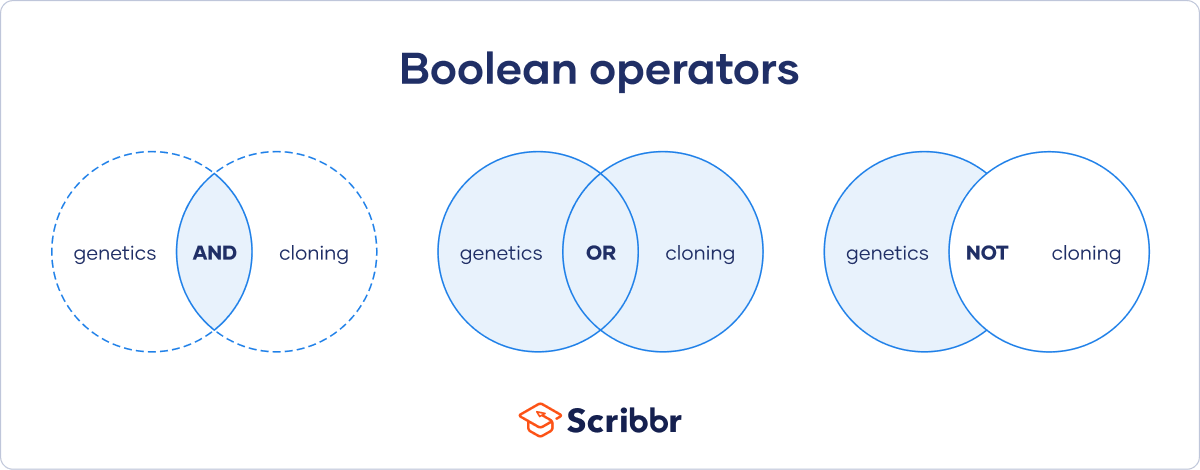Boolean Operators | Quick Guide, Examples & Tips
Boolean operators are words and symbols, such as AND or NOT, that let you expand or narrow your search parameters when using a database or search engine. When you search using these operators, it is known as a Boolean search.
You can use Boolean operators such as AND, OR, and NOT alongside keywords to create a Boolean string that will refine your search to find the most relevant results and sources.
How to use Boolean operators
Knowing how to use Boolean operators effectively can save you a lot of time and help you to find useful sources, determine the relevance of your research topic, and create strong research questions. It’s also very helpful when you’re working on a literature review or systematic review.
| Boolean operator | Function | Example |
|---|---|---|
| AND | Provides results that contain both or all keywords | paradigm AND syntagm |
| OR | Provides results that contain either keyword | meteor OR meteorite |
| NOT or AND NOT | Provides results that contain the first keyword but not the second | football NOT soccer |
| Quotation marks “” | Provides results with the exact phrase | “Newtonian mechanics” |
| Parentheses () | Allows you to group together keywords and control the order in which the terms will be searched | (rural OR urban) AND sociology |
| Asterisk * | Provides results that contain a variation of the keyword | Develop*This will return results containing words such as “development,” “developer,” and “developing.” |
AND
AND will provide search results containing both or all of your keywords.
Use this when you want results that contain two or more specific keywords.
OR
OR will provide search results containing at least one of your keywords.
Use this when you want results that contain at least one (though not necessarily both) of your chosen keywords.
NOT
NOT will provide search results containing the first of your keywords but not the second. Make sure to put your keywords in the correct order when using NOT, as the search results provided will exclude the latter keyword.
Use this when you want results that contain one specific keyword but not another.
Parentheses: ()
Parentheses allow you to group together keywords and control the order in which the terms will be searched, just like in a mathematical statement. Keywords and Boolean operators within parentheses will be searched first, followed by keywords outside parentheses.
For example, the combination shown below will provide results that are initially filtered to contain at least one of “id” or “ego,” and then further refined to also include “developmental.”
You can also use more than one pair of parentheses. The search will filter results based on the innermost parenthetical keywords first, followed by the keywords in outer parentheses, and finally the keyword(s) outside parentheses.
Quotation marks: “”
Quotation marks will provide search results containing the exact keyword(s) contained within.
Use this when you want results that contain a precise keyword or keywords.
Asterisk: *
An asterisk will provide search results containing variations of a root word.
Use this when you want results that contain the keyword that you entered or other words that begin with those letters.
This will provide results including variations of the chosen word such as “formal” and “formation.”
Each database or search engine may use Boolean operators in slightly different ways. Therefore, it is important to check how Boolean operators work in the particular database or search engine you’re using.
Note: Many databases and search engines also offer an “advanced search” option that lets you choose the most relevant Boolean operators from a drop-down list, like in the example from JSTOR below.
Proximity operators
Proximity operators are similar to Boolean operators. They let you filter results based on the proximity of one keyword to another.
Proximity operators include NEAR (Nx), WITHIN (Wx), and SENTENCE.
| Proximity operator | Function | Example |
|---|---|---|
| NEAR (Nx) | Provides results that contain your chosen keywords within x words of each other, regardless of the order they occur in | Solar N5 energy will provide results in which “energy” appears within five words of the word “solar.” This will include results such as “solar energy,” and “energy produced by solar panels.” |
| WITHIN (Wx) | Provides results that contain your chosen keywords within x words of each other in the order you entered them | Solar W5 energy will provide results in which “energy” appears within five words of the word “solar” but will exclude results in which the order is reversed, such as “energy produced by solar panels.” |
| SENTENCE | Provides results in which two or more keywords occur in the same sentence | Learning SENTENCE environment will provide results in which “learning” and “environment” appear in the same sentence, such as “a supportive environment is essential to the learning process.” |
Note: Not all databases use proximity operators. Be sure to check the search operations of the database you are using.
Frequently asked questions about Boolean search
Cite this Scribbr article
If you want to cite this source, you can copy and paste the citation or click the ‘Cite this Scribbr article’ button to automatically add the citation to our free Reference Generator.
Ryan, E. (2022, September 04). Boolean Operators | Quick Guide, Examples & Tips. Scribbr. Retrieved 22 December 2025, from https://www.scribbr.co.uk/working-sources/boolean-operator/





